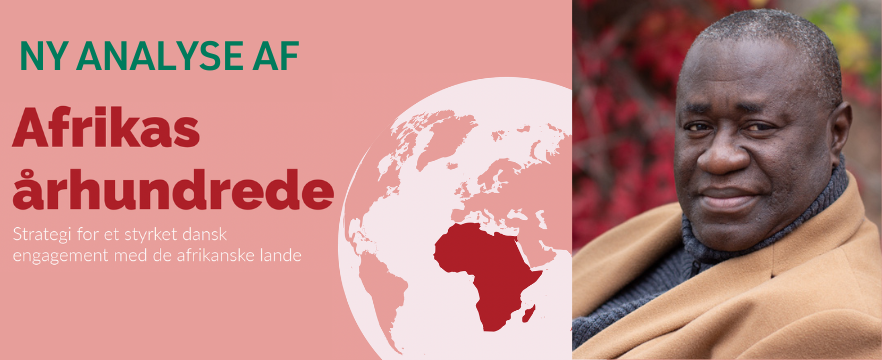
Ny analyse af Afrikas århundrede: Gammel vin på nye flasker eller ny vin på gamle flasker?
Den ghanesisk professor Kwesi Aning delte i foråret sine perskpektiver og anbefalinger til den dengang kommende dansk strategi for engagement med afrikanske lande. Som hovedtaler til et Globalt Fokus´ arrangement i Folketinget indledte han med at understrege: “Vi har brug for et nyt engagement, der redefinerer, hvad partnerskaber er, og dem der engagerer sig skal være modige nok til at lytte, stille spørgsmål og indgå i dialog, der søger konsensus.” Kwesi Aning har nu dykket ned i den færdige og lancerede strategi ´Afrikas århundrede´, og deler sin analyse med Globalt Fokus.
Globalt Fokus har bedt professor Kwesi Aning fra Kofi Annan International Peacekeeping Training Centre og tidligere gæsteprofessor ved Dansk Institut for Internationale Studier (DIIS) læse regeringens Danmarks nye strategi for engagement med afrikanske lande ´Afrikas Århundrede´ og dele sin analyse af den med os. Kwesi Aning gav tidligere på året input til, hvad strategien burde lægge vægt på for at vinde gehør blandt afrikanske befolkninger. Derfor læste han med glæde den færdige strategi, og ved første gennemlæsning havde han endnu ikke afgjort, om den for ham er gammel vin på nye flasker eller ny vin på gamle flasker. Her kommer hans analyse:
What’s in a title?
Africa’s Century: A strategy for strengthened Danish engagement with African countries
By Kwesi Aning, Security Consultant, Risk Assessments, Accra, Ghana, September 2024
Denmark’s new strategy on its future engagements in Africa is titled, ‘Africa’s century’. Although a refreshing effort, the strategy is packed with hope, optimism, and the drive and expectation for a new recalibration of Danish-Africa relations. It seeks a reset of Denmark’s engagements on the continent. It recognises Africa’s geostrategic importance as a key actor buffeted and enticed on all sides by old friends, new actors, and emerging threats. The very title of the document is interesting; with Denmark calling for a repositioning and recognising the agency of the continent. ‘Africa’s century’ is catchy, gives hope, and unlocks new vistas, avenues, and opportunities for understanding and engagement. What sets this strategy apart from others is the sincerity with which it admits that a recognition of Africa’s century is also looked at through the prism of Denmark’s national interest.
This article discusses some of the critical points in the strategy.
New wine in old bottles?
The notion of an African Century is popular in public discourses. 2015 article for Politico, about the ‘African Century’. Adam Toze, in a 2022 article for Foreign Policy recognised that, ‘It’s Africa’s century-for better or worse’. In Millman’s framing, Africa cannot be ignored because of its economic potential, urbanisation, and demographics, a phenomenon that Edward Paice termed as a ‘youthquake’. To Millman “numbers matter. Because of demographic momentum, the numbers for Africa’s population at mid-century, if not century’s end, are largely unavoidable. Whether for triumph or for tragedy, Africa is going to matter. Those of us who are not African had better get used to that idea.” To Toze: the “euphoria of “Africa rising”’ and a demographic dividend must be recognised.”
All these interpretations and angles could benefit Denmark, but Africa expects a balanced approach that also seeks to build African capacities to be efficient at all levels.
It is within this context of an Africa rising that, Denmark seeks to “…control how it positions” itself (p.3). Denmark’s positioning and its recognition of being in control of its choices is proper. However, acknowledgment of Africa having the right to be in control is not offered to its African partners as the choices that Africa makes are posed in stark terms: as to “…whether African countries will orient themselves more towards the East or West” (p.3). But this should not be a question of either/ or. Since the strategy recognises that a ‘new’ engagement is in Denmark’s interest, then the least that can be accepted is to recognise that, others have similar interests and can make the necessary choices and live with the consequences. Any oversight of this undermines the optimistic tones of “new opportunities, new hope, and fertile ground for new partnerships” (p.3) and “…creating solutions [to] make Denmark and Europe an attractive partner for African countries”. Restrictive choices do not augur well for the recalibration of old relations, a sentiment that runs through the document.
Positioning a Denmark within a Nordic, EU Lens
What does Denmark offer and bring to the table that is unique and even when located within a large EU can make qualitative differences to how it engages Africa? Here, I seek to evaluate how this balancing act can best be done by focusing on the areas in which the ‘brand’ Denmark is known for what it is: ‘a reliable pragmatic partner’ but also one that brings its expertise to bear on strategic sectors, namely: energy, water, environment, food, taxes, health, climate warming, urban development, and digitalisation.p.11.
I focus on four themes in the document:
(a) Civil societies: the pivot towards recognising civil society engagement and active participation is important. Civil societies strengthen gender rights and inclusion, contributing to halting the democratic reversals across the continent but also creating a buy-in in processes and mechanisms that impact citizens' lives. The Strategy’s recognition of the mutually beneficial impacts of deepening people-to-people engagements is important. But we have been here before. In the 1960s until the 80s, such exchanges were more frequent, less tinged with draconian rules and was predicated on a fundamental desire to contribute to change through a wider societal engagement. That has changed. Earlier engagements were internationalist in their approaches to building partnerships based on solidarity. We need to recapture that space and engage with states going through difficult transitions. Isolation will only worsen and undermine relationships that have been built over years.
(b) Peace and security: the continents' insecurities are interlinked and transforming quickly. The identified “risk of violent extremism spreading from the Sahel to the West African coastal states” is a governance deficit issue. The overwhelming, almost universalising discourse of a southward drive by extremists is fallacious and allows corrupt politicians and military leaders to reiterate this narrative. Effective governance will limit the efficacy and allure of extremist narratives and capabilities. I recognise that the peace and security landscape is ever shifting and new leaders who take over power may have totally different approaches to reversing centuries of injustices. In that process, excesses may occur, and interests will not align in the short term. But this is a game of the longue durée that is conscious of historical perspectives. Denmark’s interests are best served by staying for the long haul and bringing about incremental qualitative changes, one small step at a time.
(c) Disinformation: ‘Africa’s century’ shows an obsession with Russia and China that sometimes colors the thrust of the analysis. Disinformation and misinformation targeting African countries are not what keep Africans awake. African politicians are the greatest culprits in mis(dis)informing their populace in their drive to gain power. When power is gained through unethical misuse and deliberate fabrication of lies, that is not Russia’s fault. The waving of Russian flags at demonstrations is more a reflection of governance failures and an opportunistic expression of anger against corrupt incompetent leaders. Focusing on the wrong idea of who is misinforming who and in what context needs to be nuanced. The optimism in this document can only be achieved whether in trade or all the other sectors, when African states build strong institutions and hold those who lead to account. That is how the optimism that runs through the document can be achieved; and finally relates to,
(d) The green transition: Here, Denmark’s interest is “enter[ing] into more green, strategic partnerships with African countries that can bring…sector-specific interests together” p.10. There is no doubt that with the impacts of climate change impacting on all aspects of livelihoods and posing existential threats, the situation is urgent. Africa is key to finding global solutions. As countries seek to shape a more sustainable future, Africa is seen as holding the key – and the resources – to power a green transition. However, global powers are eyeing Africa’s resources and nature towards a greener future. This growing interest has far-reaching consequences and must be managed well and sensitively. History must guide us: Almost 150 years after the scramble for Africa, narratives around “green transitions” and Africa’s role in it are mainly being shaped in European capitals and for Western interests.
Dialogic engagement predicated on trust and recognising is the key to success
Africa’s Century is a most welcome policy statement as Denmark seeks to recalibrate its relationship with a continent rising. Attaining the optimism and expectations of both sides will need an open, honest, dialogic engagement predicated on trust and recognising how our shared histories must be the lens through which new charted engagement must occur.
- Oprettet den .

